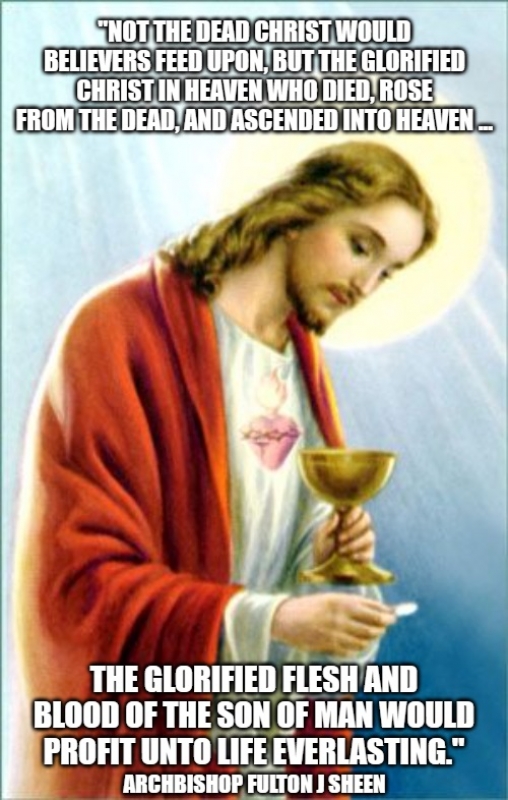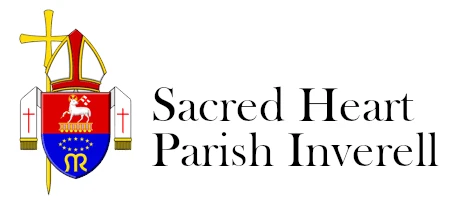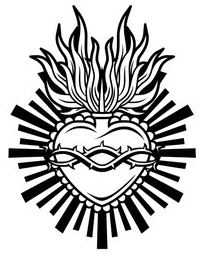Solemnity of the Most Holy Body & Blood of Christ (Corpus Christi) - 11 June
11th June 2023

Solemnity of the Most Holy Body & Blood of Christ (Corpus Christi) - 11 June
“I put before you the one great thing to love on earth: The Blessed Sacrament. There you will find romance, glory, honour, fidelity, and the true way of all your loves upon earth.” - John R.R Tolkien
A reflection on today's Gospel by the Venerable Archbishop Fulton J Sheen:
"'And now what is this Bread which I am to give? It is My Flesh, given for the life of the world.’ Then the Jews fell to disputing with one another, ‘How can this Man give us His Flesh to eat?’ Whereupon Jesus said to them, ‘Believe Me when I tell you this; You can have no life in yourselves, unless you eat the Flesh of the Son of Man, and drink His Blood’ (John 6:52–54).
"He not only pictured Himself as One Who had come down from heaven but as One Who had come down to give Himself, or to die. It would only be in the slain Christ that they would come to understand the glory of a Bread that nourishes unto eternity. He was here referring to His death; for the word ‘giving’ expressed the sacrificial act. The Flesh and Blood of the Incarnate Son of God, which would be severed in death, would become the source of everlasting life. When He said, ‘My Flesh,’ He meant His human nature, as ‘The Word became Flesh’ meant that God the Word or the Son assumed to Himself a human nature. But it was only because that human nature would be linked to a Divine Personality for all eternity that He could give eternal life to those who received it. And when He said that He would give that for the life of the world, the Greek word used meant ‘all mankind.’
"How carnal was the eating of the manna, and how spiritual was the eating of the flesh of Christ! It was a far more intimate living by Him than a baby’s living by the nourishment supplied by the mother. Every mother to every child at her breast can say, ‘Eat, this is my body; this is my blood.’ But actually the comparison ends there; for in the mother-child relationship, both are on the same level. In the Christ-human relationship, the difference is that of God and man, heaven and earth. Furthermore, no mother ever has to die and take on a more glorious existence in her human nature before she can be the nourishment of her offspring. But Our Lord said that He would have to ‘give’ His life, before He would be the Bread of Life to believers. The plants which nourish animals do not live on another planet; the animals which nourish man do not live in another world. If Christ then was to be the ‘Life of the World,’ He must be tabernacled among men as Emmanuel or 'God with us,' supplying a life for the soul as earthly bread is the life of the body.
"But the mind of His hearers rose no higher than the physical, as they asked: How can this man give us His flesh to eat?
"It was madness for any man to offer his flesh to eat. But they were not left long in the dark as Our Lord corrected them, saying that not a mere man, but 'the Son of Man' would give it. As usual, that title referred to the expiatory sacrifice He would offer. Not the dead Christ would believers feed upon, but the Glorified Christ in Heaven Who died, rose from the dead, and ascended into heaven. The mere eating of the flesh and blood of a man would profit nothing; but the glorified Flesh and Blood of the Son of Man would profit unto life everlasting. As man died spiritually by physically eating in the Garden of Eden, so he would live again spiritually through eating the fruit of the Tree of Life.
"Christ’s words were too literal, and He cleared up too many false interpretations, for any of His hearers to claim that the Eucharist (or Body and Blood He would give) was a mere type or symbol, or that its effects depended upon the subjective dispositions of the receiver. It was Our Lord’s method whenever anyone misunderstood what He said to correct the misunderstanding, as He did when Nicodemus thought ‘born again’ meant re-entering his mother’s womb. But, whenever anyone correctly understood what He said, but found fault with it, He repeated what He said. And in this discourse, Our Lord repeated five times what He had said about His Body and Blood. The full meaning of these words did not become evident until the night before He died. In His last will and testament, He left that which on dying no other man has ever been able to leave, namely, His Body, Blood, Soul, and Divinity, for the life of the world." (Life of Christ)
Anima Christi (St Ignatius of Loyola)
Soul of Christ, sanctify me.
Body of Christ, save me.
Blood of Christ, inebriate me.
Water from the side of Christ, wash me.
Passion of Christ, strengthen me.
O Good Jesus, hear me.
Within Thy wounds hide me.
Never let me be separated from Thee.
From the evil one, protect me.
At the hour of my death, call me; and bid me come to Thee.
That with Thy saints and angels, I may praise Thee forever and ever. Amen. 🙏💖💐
Food for thought
We believe that Jesus Christ is really, truly, and substantially present in His Body and Blood, Soul and Divinity, on our altars: under the appearance of bread and wine. How do we know it? Our Lord told us “This is My Body...This is my Blood.”
Transubstantiation is the total change of substance of bread into the Body of Christ and of the substance of wine into the Blood of Christ at the moment of consecration. While the bread and wine retain the appearance and physical makeup of bread and wine, in reality God has changed their substance into the Body and Blood of Christ. Jesus Christ is therefore truly and physically present in each consecrated host. What a pity, then, that so many receive Him in Holy Communion with indifference and lack of care. He is our sanctification and redemption. Therefore, let your reception of Him be done in loving reverence. Prepare yourself mentally and spiritually through prayer and confession to receive Jesus in a worthy manner.


